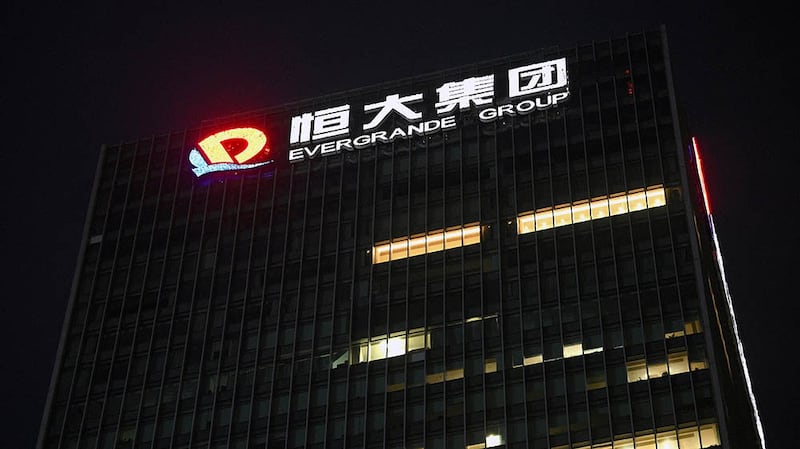Protesters have been gathering outside the offices of Chinese property giant Evergrande in recent days to demand their money back, as the company struggles to repay debts of more than U.S.$300 billion amid a liquidity crisis.
Chanting "Pay us back! Pay us back!", dozens of protesters gathered outside the company's headquarters in the southern city of Shenzhen on Wednesday, after the company warned it may not be able to service its debts, and offered property and parking spaces in a bid to stave off creditors' demands.
They refused to disperse despite a strong police presence, with some shouting for Evergrande founder Xu Jiayin to pay them back.
Investors also gathered outside Evergrande offices in the eastern province of Jiangsu on Wednesday morning, with protests also reported in neighboring Anhui, and the central province of Hubei.
Hong Kong-listed Evergrande has taken money from prepaying customers to built more than one million housing units, many of them first-time buyers who have put everything they have into a bid to get on the property ladder.
In a statement on Monday, it denied widespread speculation that it is about to undergo bankruptcy proceedings and restructuring, saying it has "resumed production," and would guarantee the delivery of buildings under construction.
Then, the company admitted on Tuesday it is under "tremendous pressure" and may not be able to meet its liabilities.
Beijing-based rights activist Hu Jia said Evergrande's creditors include thousands, possibly tens of thousands of ordinary people who can ill afford to lose their investments.
He predicted a crackdown on the protests by the ruling Chinese Communist Party (CCP), regardless of Evergrande's eventual fate.
"All discussion of this topic is under surveillance on [social media], and they will find the leaders, organizers and advocates on WeChat and QQ," he said. "They will break the movement by calling some of them inciters."
"They know how these protests are initiated, what state they are in, how much support they command, and how to fragment and pacify them," he said. "It's all part of [the CCP's] housekeeping skillset."
He said the CCP was unlikely to allow the situation to get out of hand.
"A real estate crisis would trigger a financial crisis, then an economic crisis, and then a social and political crisis," Hu said. "So I believe the CCP will take a very hard line while this is still just a real estate crisis."

What the CCP wants
An industry insider surnamed Xu agreed, but didn't think it would lead to a good outcome for ordinary investors and homebuyers.
"The millions of ordinary people are no better than ants; they don't think about them," she said. "What matters is what the CCP thinks, and what it wants to happen, and that's what will happen."
"If Evergrande doesn't win the backing of the CCP, they're toast," Xu said.
Hu said it would be hard for the government to decide whether or not to bail out Evergrande, however.
"If they bail them out, will they then bail out all the other real estate companies as well?" he said. "If they don't, it could lead to social instability."
Beijing-based current affairs commentator Ji Feng said he expects the government to act decisively to solve part of the crisis, then hope that the rest of the protests will turn into long-running petitions, most of which will be unsuccessful.
"The vast majority of [petitions] end in failure, by their own accounts," Ji said. "How many people ever get compensated?"
"If there is a little bit of money left over, they might give you some, but if not, then forget it! The CCP isn't going to pay up [out of its own coffers] because it's in financial difficulties itself," he said.
Industry insiders told RFA that around 800 Evergrande construction projects have been suspended since the crisis became known.
Local authorities in the southern city of Foshan suspended mortgage registrations for at least nine Evergrande projects in the area, sparking fears that other local governments across China could follow suit.
"If they stop registering mortgages for their real estate, then anyone buying one of their homes won't be able to get a mortgage," an industry insider surnamed Li told RFA. "Then they won't be able to sell it on, either."
"So far, this situation has only happened in Foshan, but once it becomes known, it could prompt similar notices for Evergrande properties in other parts of the country," he said. "That would cause a huge amount of trouble [for the government]."
Foshan officials confirmed to RFA this week that Li's account was accurate, saying that such a notice had indeed been issued.
Earlier bailout
Evergrande's liquidity crisis follows its rapid expansion into 280 Chinese cities since its founding in the early 1990s.
In September 2020, Evergrande requested a bailout from the Guangdong provincial government, then tried to dispose of assets in the following year in a bid to service its massive debt burden.
Ratings agency Fitch said in a note on Wednesday that the government would likely take some kind of action to protect investors' interests.
"An Evergrande default could damage consumer confidence if it were to affect households' deposits for homes that have not yet been completed, but we assume the government would act to protect households' interests, making this outcome unlikely," the note said.
Fu Linghui, a spokesperson for China's State Statistics Bureau, said on Wednesday that the government is carefully watching the situation in the real estate sector.
"The real estate sector has been generally stable since the start of the year, as governments across the country started to follow the principles of non-speculation," Fu said.
"All aspects of real estate regulation have been stepped up to curb 'unreasonable demand' in the market, and gradually return demand to normal levels. The market continues to improve, and the real estate sector is expected to remain stable."
Translated and edited by Luisetta Mudie.
